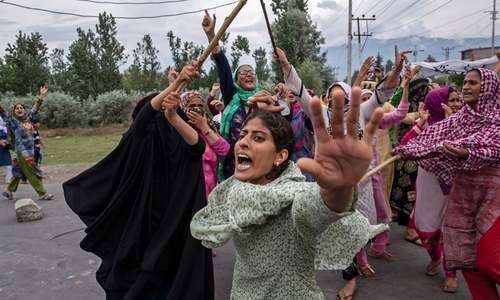SRINAGAR: Indian soldiers fatally shot a young man at a checkpoint in occupied Kashmir on Wednesday, residents and officials said, triggering anti-India protests and clashes in the disputed Himalayan region.
India’s Central Reserve Police Force said the man was driving a car and ignored signals to stop at two checkpoints in the western outskirts of occupied Srinagar. It said the soldiers feared sabotage because a military convoy was passing by at the time.
It said in a statement that a soldier shot the victim when the car didn’t stop despite warning shots.
The slain man’s father, Ghulam Nabi Shah, denied the police account, saying his son did not drive through any checkpoints, and that soldiers first stopped him and then shot him.
A witness, Firdousa, said the victim stopped his car when soldiers signalled him. “A security official told him something to which he replied that he had some emergency. They let him go but as he was getting into his vehicle, they shot him in the back,” she said.
“He was killed deliberately. He did no wrong.”
As news of his death spread in his village, hundreds of men and women began chanting “Go India, go back” and “We want freedom” and demanded that the victim’s body be returned to the family for burial. Authorities did not immediately hand over the body.
As Indian forces moved in to stop the villagers from marching, hundreds threw stones at the troops, who fired shotgun pellets and tear gas to quell the protests. Many were injured in the clashes and most were treated locally. At least two women with pellet injuries to their eyes were taken to the main hospital in Srinagar for treatment, a doctor said on condition of anonymity because medics have been barred from briefing the media.
Authorities shut down mobile internet service, a common Indian tactic in the disputed region when such protests erupt. They also ordered a probe into the shooting. Rights groups say such probes rarely yield any concrete results and are often aimed at calming public anger.
Indian forces have imposed a stringent lockdown in the Himalayan region since late March to combat the new coronavirus. But despite the lockdown, India has stepped up its counterinsurgency operations while local fighters have also continued their attacks on Indian forces and alleged informants.
Indian soldiers man checkpoints and bunkers across the region, where an armed resistance to Indian rule has raged since 1989. Residents make little secret of their anger at the troops’ presence and support the fighters’ call for the territory to be united either under Pakistani rule or as an independent country.
About 70,000 people have been killed in the uprising and the ensuing Indian military crackdown.
Published in Dawn, May 14th, 2020















































